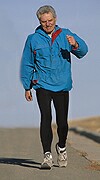
MONDAY, May 5, 2014 (HealthDay News) — When it comes to exercise, reaching “retirement age” is no time to slow down: Seniors who maintain or boost their physical activity levels are less likely to suffer a heart attack, a new study suggests.
Exercise improves the electrical well-being of their hearts and reduces the risk of heart rhythm problems, the researchers explained.
They examined heart monitor data collected from 985 older adults, average age 71, over five years. The more physical activity the participants did, the better their heart rate variability, according to the findings appearing May 5 in the journal Circulation.
Heart rate variability refers to differences in the time between one heartbeat and the next.
“These small differences are influenced by the health of the heart and the nervous system that regulates the heart,” study author Luisa Soares-Miranda said in a journal news release.
“Early abnormalities in this system are picked up by changes in heart rate variability, and these changes predict the risk of future heart attacks and death,” explained Soares-Miranda, a researcher at the Harvard School of Public Health, and the faculty of sport at the University of Porto in Portugal.
The researchers also found that seniors whose walking distance or pace improved over five years had better heart rate variability than those who had decreases in how much or how fast they walked.
Seniors with the highest levels of physical activity would be 11 percent less likely to suffer a heart attack or sudden cardiac death than those with the lowest levels, the study authors calculated.
“Any physical activity is better than none, but maintaining or increasing your activity has added heart benefits as you age. Our results also suggest that these certain beneficial changes that occur may be reduced when physical activity is reduced,” Soares-Miranda said.
“So if you feel comfortable with your usual physical activity, do not slow down as you get older — try to walk an extra block or walk at a faster pace. If you’re not physically active, it is never too late to start,” the researcher advised.
More information
The U.S. National Library of Medicine has more about seniors and exercise.
Copyright © 2026 HealthDay. All rights reserved.

